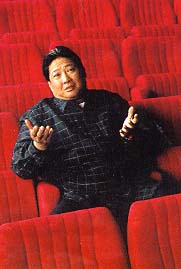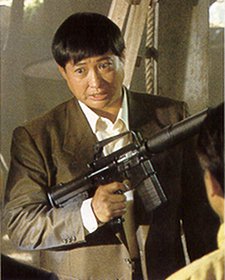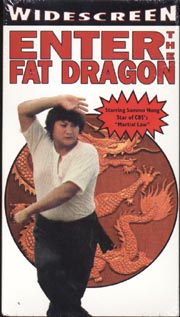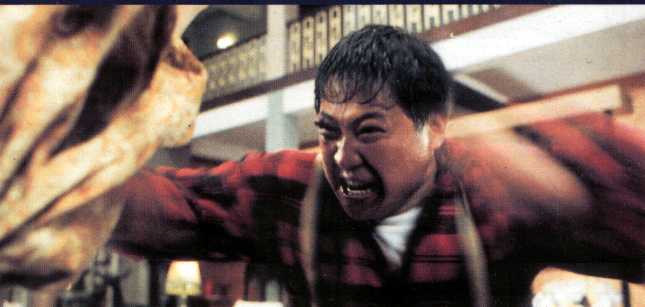



|
|
Hung Kam-Bo was born on January 7, 1952 in Hong Kong, where he was raised by his grandparents since both of his parents worked in Hong Kong's blooming movie industry. From an early age, Hung knew he wanted to perform for an audience, so he begged his grandparents to let him enroll in the Peking Opera Academy, which they did in 1960, when Kam-Bo was only eight years old. At first, the sifu (teacher) Yu Jim Yuen was not sure of Hung's abilities due to his large size (young Kam-bo always had a fondness for food). But soon Yuen was swayed by Hung's acrobatic abilities, and, perhaps more importantly, his stern manner, which Yuen felt would help keep the other students in line. Hung was formally accepted into the school and took the name Yuen Chu (all the members took the surname Yuen out of respect -- and fear -- of their sifu).
The hard times Hung and other Academy notables such as Jackie Chan, Yuen Biao and Corey Yuen experienced are all well-known, especially after Hung himself starred in a movie about the Academy called Painted Faces (1988). The group would rise before dawn and do exercises until noon, when they were finally allowed to clear their bladders. After a small lunch, the students would train until dusk, after which they would have to do chores until around midnight. Anyone caught goofing off or slacking would be dealt swift punishment, but those who impressed sifu Yuen would be allowed into the "Seven Happy Fortunes" troupe, which was the main money-making source for the school. As he moved into his teenage years, Hung became the "big brother" of the group, something that irritated his "brothers" to no end, since he was seen by many (especially Jackie Chan) as a bully.
By the early 1970's, it became clear that the Academy was losing money, so Hung left the school to try his luck in the movie business, which was beginning to boom from the popularity of Bruce Lee. (At this point, Hung took the stage name "Sammo" after a popular rotund cartoon character.) Sammo's skill and dedication to hard work made him one of Hong Kong's top stunt/action co-ordinators, which led to a signing with the upstart Golden Harvest studio. During his time at Golden Harvest, he began to try his hand at acting as well, often as the bad guy due to his unusual looks -- a rough-and-tumble heavy-set man with a prominent scar on his face which he had gotten in a bar fight over a woman. By 1978, Hung had so much clout in HK film (he and his stunt team were regarded as the best in the business) that he was able to form three production companies -- Gar Bo, Boho and Bojon.
In the early eighties, Hung ran into his old brother Jackie Chan at a bar. Previously, Hung had helped out Chan before in the late '70's when Jackie (as most martial artists in HK) was struggling to find work. Now, even Hung was having trouble finding work. It just seemed as if audiences had become tired of martial arts pictures (mostly due to the avalanche of Bruce Lee imitator movies that came after his death -- something which Hung himself had addressed in 1978's Enter the Fat Dragon). Joined by another brother, Yuen Biao, the trio sat around drinking and trying to think of fresh ideas for movies. One such idea would become Winners and Sinners (1983), which became a huge hit and revitalized the martial arts genre. The trio of Hung, Chan and Biao -- known as the "Three Brothers" -- would go on to star in a series of highly successful films in the mid-1980's, including Project A (1984) and My Lucky Stars (1985).
However, the old Academy rivalries could not stay buried forever. By the time filming wrapped on Dragons Forever (1988), Hung and Chan were literally at each other's throats. Some say it was because Hung was jealous of Chan's international success with films like Police Story (1985), but Chan himself admitted in his biography that he was just as much to blame for the breakup of the Three Brothers. Undaunted, Hung kept on working on both sides of the camera in such films as 1989's Pedicab Driver, widely noted as one of the best martial arts films ever. By the mid 90's, things had cooled down between Hung and Chan. Sammo was the action co-ordinator on Chan's Thunderbolt (1995) and directed 1997's Mr. Nice Guy.
Hung moved over to the US in 1998 to work on a short-lived TV series called Martial Law. After the show's failure in the ratings (mostly due to extremely poor writing and a second season which scrapped much of the momentum built up during the first by deleting and replacing some of the show's major characters), he has moved back to Hong Kong, where he is currently working on several films, including a live-action adaptation of the popular Tekken video game.
Thanks to sammohung.com for the some of the pics and info.